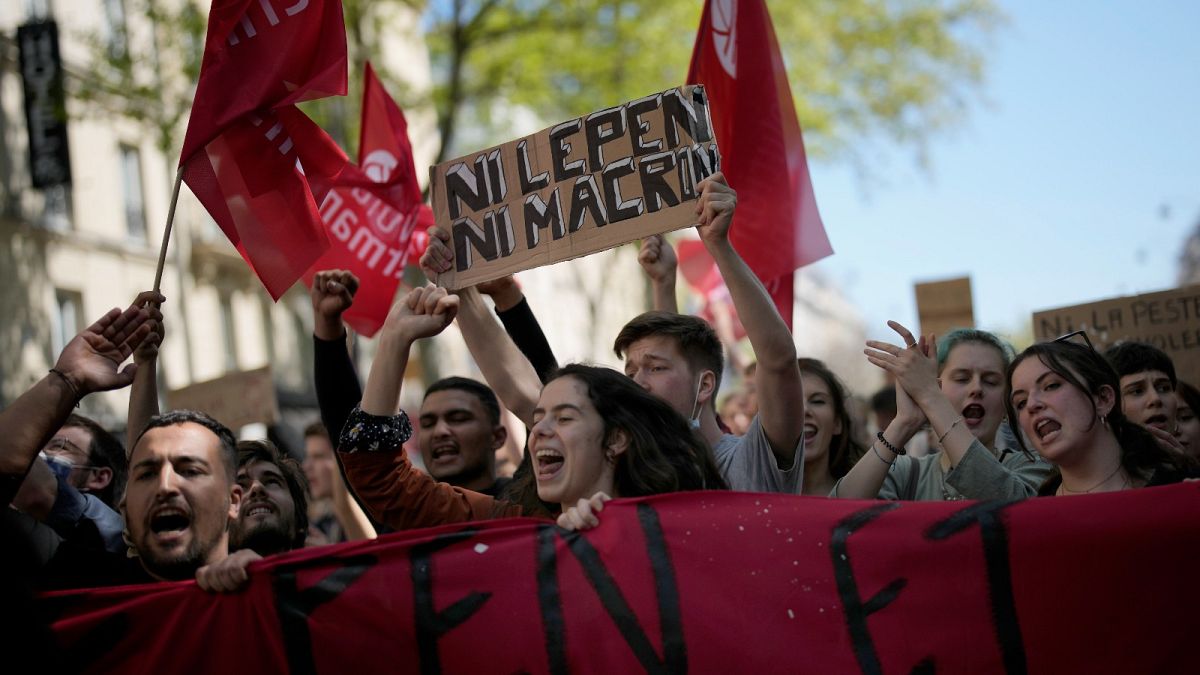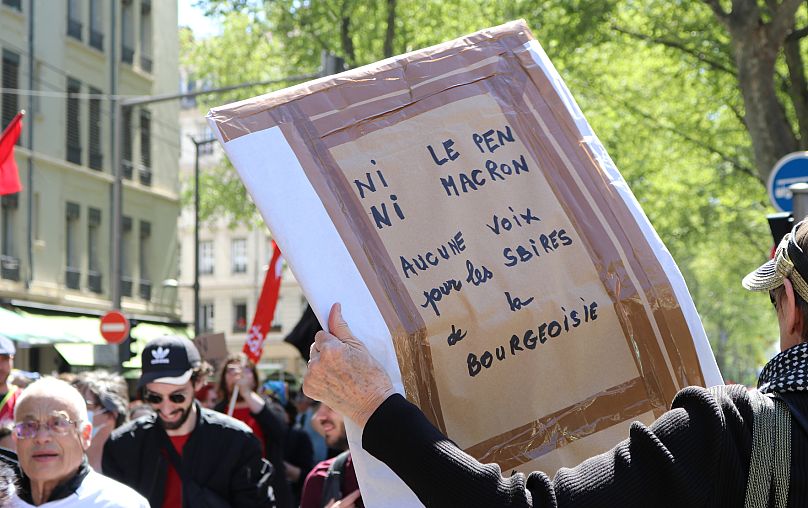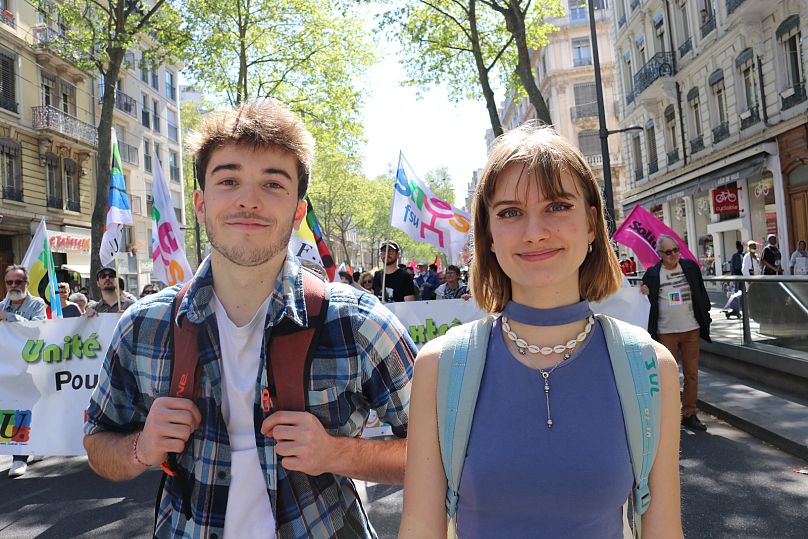Kingmakers on France's left face a difficult choice on Sunday: voting for Macron -- widely disliked on this wing of French politics -- or abstaining and letting Marine Le Pen into power.
Some of France's left-wing voters are struggling to decide how to vote in the presidential run-off that will see incumbent President Emmanuel Macron face far-right candidate Marine Le Pen.
Even those who say they are planning on voting for Macron in the second round said that it would be hard to put his name in the envelope this time around.
"I have the feeling that now here we go again for five more years. It’s like a prison sentence, I feel like we’re not advancing, all the climate issues have been swept away," said 30-year-old Anselm, who attended a protest against the far-right in Lyon over the weekend.
He voted for far-left candidate Jean-Luc Mélenchon who came third in the first round of France's election and Anselm said he has now made the decision to vote "for the other candidate" in the second round.
"I am voting against Marine Le Pen," he said.
When asked to clarify whether that meant he would vote for Macron, Anselm said: "I’m going to vote for Macron and then I’m going to keep protesting in the streets against him because I’m sick of strategic voting, I hope this will be the last time."
Both Le Pen and Macron have been attempting to woo voters who supported Mélenchon, who won 22% of the vote in the first round, just a point shy of Le Pen.
He was the third major candidate to emerge in the election with the rest receiving under 8% of voter support.
Mélenchon called for his supporters "not to give a single vote to Marine Le Pen". But he stopped short of calling on them to vote for Macron, unlike several other first-round candidates including the Green Party's Yannick Jadot, right-wing Valérie Pécresse and socialist Anne Hidalgo.
Instead, Mélenchon has shifted his focus to legislative elections in June, urging French voters to support his party in an effort to "elect him prime minister".
His more than 7.7 million voters are nonetheless likely to have an impact in the run-off as the next largest voting group from the first round. But a large proportion of them could abstain or vote blank, according to his party's poll of 215,000 of his supporters.
Around 37% said they would vote blank in the second round and nearly 29% said they would abstain, Mélenchon's party (France Unbowed) said. Around 33% said they would vote for Macron whereas the choice of Le Pen wasn't offered by the party.
But if Mélenchon voters do "abstain massively, it could be problematic for Emmanuel Macron," said Tristan Haute, a senior lecturer in political science at the University of Lille, who studies abstention.
"These voters come from urban areas or from the banlieue, where they could very well mobilise in favour of Macron...to block Marine Le Pen as a reflex against racism," he added.
Haute points out that in 2002 to block Le Pen's father's far-right candidacy, there was a strong mobilisation of voters despite record-high abstention in the first round.
Polls ahead of this year's run-off however are showing "more of a de-mobilisation between the two rounds, meaning voters whose candidate did not qualify for the second round" are less likely to show up to vote in the runoff, Haute said.
This lack of potential electoral support is already showing a much tighter race between Macron and Le Pen in Sunday's run-off, with Macron leading by a much smaller margin compared to 2017 when he defeated Le Pen 66.1% to 33.9%.
A recent Ipsos poll put voting intentions in the second round this year at 57.5% for Macron and 42.5% for Marine Le Pen while an earlier Elabe poll suggested Macron was at 54.5% in voting intentions and Le Pen at 45.5%.
Antonio Barroso, managing director at global advisory firm Teneo, said that Macron faces two main challenges: first that Mélenchon has been strongly opposing the president for the last five years and second that there is a voter perception "that he has abandoned part of the left".
"The perception is that some of his economic policies were shifted towards the centre-right and I think that that has shaped the perception of many voters on the left of the spectrum," he said.
Macron's appointments of a right-wing interior minister and centre-right prime ministers have also influenced voters on the left.
At a protest against the far-right in Lyon on Sunday, there were posters against both Le Pen and Macron, with some people admitting they would likely abstain in the runoff election.
"The left sadly is not present in the second round. I want to show my dissatisfaction. I’m going to help out to count the votes at my polling centre but honestly, I think I will abstain from the run-off," said Ayete, a 22-year-old masters' student in law.
"If Le Pen in the polls leading up to the election is at 52%, I might resolve to go vote for Macron," she said.
That sentiment was echoed by other left-wing voters who said they were following the voting intentions but that it would likely come down to a last-minute decision.
"I’m going to look at the Swiss and Belgian websites on Sunday at the last moment to see if there’s a need for me to vote Macron or not," said Laura, a 20-year-old student, referring to the media blackout in France that isn't observed in neighbouring countries.
"If (he looks likely to win) I’m going to abstain, but if (it looks like Le Pen is leading) I’ll go vote for Macron," she said.
For those left-wing voters who said they would vote for Macron, many said that they weren't happy about it.
"I think I’m going to vote for Macron on Sunday. It’s not a choice from the heart but it’s necessary against the far-right," said Nina, a 20-year-old student at the University of Lyon 3.
Other voters protesting over the weekend said they had voted for Macron before and could do it again, but were mainly disappointed about his climate inaction.
At a campaign meeting in Marseille, Macron attempted to ease concerns on the left, stating that his prime minister would be in charge of environmental planning.
French investigative outlet Mediapart hosted two debates of 45 minutes among left-wing voters, including activists and NGO workers, on whether they would vote for Macron or abstain from the election.
During a debate on 18 April, Catherine Corsini, a French film director who had supported Mélenchon in the first round, said at first she had decided to vote blank in the runoff because she couldn't vote for Macron but later changed her mind.
"I couldn't help myself from listening to the radio and hearing Marine Le Pen and I decided it's not possible. I will go and vote for Emmanuel Macron because of my gay friends (and) friends who have immigrant parents," she said, adding that Le Pen made her afraid for society.
"But I won't be angry at the young people who abstain because the choice we're offering them is disgusting," Corsini added.
At the weekend protest in Lyon, 29-year-old Camille, who works in the social sector, said she understood that the run-off was a difficult choice for left-wing voters but urged people to vote against the far-right.
"I get that it’s a difficult choice to vote either Macron, blank or to abstain, but blank votes and abstention aren’t taken into account so if everyone is having a hard time, it’s Marine Le Pen who will win," she said.


